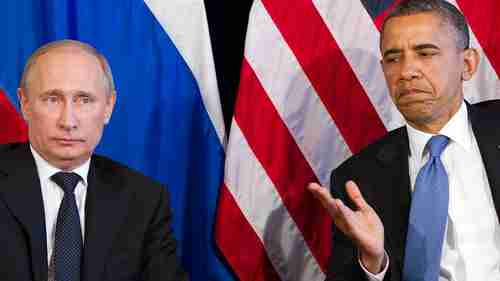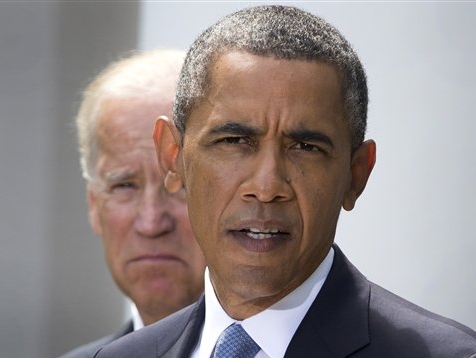
This morning’s key headlines from GenerationalDynamics.com
- President Obama goes into ‘Obamacare mode’ over Syria issue
- Egypt’s Mohamed Morsi accused of inciting violence
President Obama goes into ‘Obamacare mode’ over Syria issue

Vladimir Putin and a scowling Barack Obama at their June, 2012 meeting (AP)
The Syria crisis has apparently turned into an existential crisis forthe presidency of Barack Obama, as he shifts gears to prepare forcontinuing speeches and briefings in an effort to get Congressionalapproval for military action in Syria. ( “1-Sep-13 World View — U.S. foreign policy in chaos as Obama reverses himself on Syria”)
The issue has deeply divided the public in both political parties,with polls showing almost 80% opposing any intervention at all.However, President Obama has now personally committed both himself andthe country to military action, and he will be bringing all of hisspeech-giving and community organizer skills to bear on gettingapproval from Congress, as he did for Obamacare.
Secretary of State John Kerry appeared on all of the Sunday morningnews shows, looking like he hadn’t slept in two days, which may wellbe the case after President Obama pulled the rug out from under him.
Republicans have been vitriolically critical of Obama for severaldays, criticizing his handling of the Syria issue, and his plan for amilitary strike with cruise missiles that would accomplish nothing butboost his ego.
But now, even Obama’s supporters are questioning his competence aspresident. This was apparent on Sunday from the comments of reporterson CNN who have always been totally in the tank for Obama — up untilnow.
The last time that I wrote about CNN political analyst David Gergenwas in 2009 in the article “Vile ‘teabagging’ jokes signal the deterioration of CNN and NBC news”.
So it was quite surprising on CNN on Sunday to hear him questionBarack Obama’s competence as President, in an interview along withPresident Bush’s Undersecretary of State Nicholas Burns. Gergen wasasked what Obama is going to say to Russia’s president Vladimir Putinwhen they both attend the G20 meeting in St. Petersburg next week, andthey face each other “eye to eye”:
“DAVID GERGEN: Whatever it is, it’s going to be frostyon both sides. I don’t think they will talk very much. I think arisk, and Nick was pointing out some of the risks, there is a verydefinite risk that Russia now will step up its armaments of theSyrians in preparation for an attack.
After all, this is their friend [al-Assad]. They are going to saythis is a wrongful action with no international support, illegalinternationally and we’re going to step it up.
So there are those risks, I think. I think the bigger risk, andwhat the president has got to work on here, is that you can sayit’s wise to have call for the Congress to do this, but the way hewent about it, it was so jerky and unpredictable, that I thinkit’s raised questions about just how firm a grip he has on thewheel as a commander in chief.
After all, starting with the drawing of the red line itself, whichseemed to be sort of almost by the way, it’s a red line, asopposed to a well thought-out plan, and now we have no apparentstrategy for long term in the Middle East. Nick knows this betterthan I do.
But presidents need to be seen in control of events and guidingevents, and not just reacting or bouncing around. I’d welcomeNick’s views.
NICHOLAS BURNS: I think David’s right. The United States has to –the administration has to regroup here. The Congress has to votein favor of this resolution or else the credibility of the UnitedStates as a global power in the Middle East is going to be vastlyreduced.
And it means also that the administration has to give the kind ofpowerful performance that Secretary Kerry gave this morning on allthe Sunday shows. … He gave a ringing endorsement for why it’simportant for us to act.
We have to see that kind of consistency, resolve and strength fromthe administration. That’s what the world is looking for. Itdidn’t see it this week. I hope we’ll see it in the next week ortwo.”
I think that I can honestly say that I never expected to hear DavidGergen say anything remotely like, “the way he went about it, it wasso jerky and unpredictable, that I think it’s raised questions aboutjust how firm a grip he has on the wheel as a commander in chief.”
Nor would I ever have expected much criticism for Obama from CNN’scommentator Fareed Zakaria, who has been totally in the tank for Obamauntil now:
“Last March, President Barack Obama spoke off-the-cuffabout how Syria’s use of chemical weapons would be asense that he meant.
It has been an event that has confused and confounded the Obamaadministration. Whatever your views on the larger issues, it’shard not to conclude that the administration’s handling of Syriaover the last year has been a case study in how not to conductforeign policy.
The president started out with an understanding that the Syrianconflict is a messy sectarian struggle that cannot be influencedeasily by American military intervention. He was disciplined inresisting calls to jump into a cauldron.
But from the start, he confused and undermined this policy withloose rhetoric, perhaps egged on by some of his advisors andcritics to “do something.” So, he announced just over two yearsago that President Bashar al-Assad of Syria had to go.
Now, a pundit can engage in grandiose rhetoric. The president ofthe United States should make declarations like that only if hehas some strategy to actually achieve it. He did not.
In truth, Obama and many others miscalculated. They believed thatAssad’s regime was near the end, misreading both its strength andbrutality, but also the level of support it has from severalsegments of Syrian society.
Then, just about a year ago, came the off-the-cuff remarks about ared line on chemical weapons, insufficiently thought through butnow publicly stated and definitive.
Since then, American foreign policy in Syria has largely beenconcerned about ensuring that Obama’s threat does not seemempty. After all, what American national interest is beingfollowed?
The administration says it is upholding international law. Except,as Fred Kaplan points out in Slate, the institutions that embodyinternational law and consensus, the United Nations and otherinternational organizations, do not support this action.
The United States plus France and Turkey cannot be considered theembodiment of international law and global public opinion.
The nature of the strike, we are told, will be short and symbolic,a shot across the bow, in the midst of a civil war in which bothsides are in a high-stakes struggle for survival.
Does anyone think that this will make any difference? And then,the strangest twist, an unplanned, last minute appeal to Congress,paving the way for further delay, weakening momentum, erasing whatlittle surprise existed, and setting the stage for a potentialdefeat at home.
I don’t think that this strike, should it eventually take place,will be as damaging as its critics fear. The Assad regime willlikely hunker down, take it, and move on.
It will make little difference one way or the other. But themanner in which the Obama administration has first created andthen mismanaged this crisis will, alas, cast a long shadow onAmerica’s role in the world.”
Many analysts are predicting that President Obama will winCongressional approval because there’s so much at stake, in that adefeat would be devastating to his international credibility and theinternational credibility of the entire nation. The result is thatDemocrats will fall into line behind the President, and enoughRepublicans will support military action to gain Congressionalapproval.
Ironically, Obama will be going into “Obamacare mode” at a time whenObamacare itself is under fire, having suffered a series of disastroussetbacks. (See “5-Jul-13 World View — Eurozone and Obamacare continue their parallel economic collapse”)
President Obama had expected to devote all his energies in Septemberto selling Obamacare, to prevent a collapse of the “Obamacareexchanges,” which are scheduled to open on October 1, but which arewoefully behind schedule. He’ll now have to split his communityorganizing and speech-making skills between Syria and Obamacare, andRepublicans will be sure to demand concessions on one issue inexchange for support on the other issue. CNN-SOTU Transcript and CNN-Fareed Zakaria Transcript
Egypt’s Mohamed Morsi accused of inciting violence
Former president Mohamed Morsi, who has been detained in an unknownlocation since he was deposed in an army coup on July 3, is now beingcharged in criminal court for ten deaths in clashes between his MuslimBrotherhood supporters and his opponents, after he assumed dictatorialpowers in a constitutional decree. Morsi and 14 members of hispresidential staff have been accused of ordering their supporters toattack peaceful protesters who assembled outside the presidentialpalace to denounce his decree. The move reportedly came after therepublican guards and ministry of interior refused to obey orders toattack protesters. Al-Ahram (Cairo)
Permanent web link to this article
Receive daily World View columns by e-mail

COMMENTS
Please let us know if you're having issues with commenting.